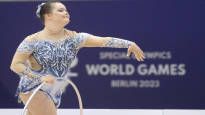The Finnish team won 54 medals at the Special Olympics summer world championships for the mentally disabled. Journalist Alexandra Kral-Leszczynski, who followed the Games in Berlin, tells her five observations about the Games in her analysis.
Alexandra Kral-Leszczynski The reporter followed the Special Olympics event in Berlin
Finland’s 65-strong Sisugengi succeeded wonderfully in the Special Olympics world championships for the intellectually disabled, which ended in Berlin on Sunday. The team returns home with no less than 54 medals.
What else were the games but a wonderful shower of medals for the Finns?
1. Great athletes
A sports competition cannot be successful without great athletes. In Special Olympics, all athletes have worked tremendously throughout their lives to achieve the skills they have now. Athletes practice almost every day to improve their skills.
According to the coaches, for many, simply figuring out the directions or understanding the instructions creates great challenges, so for example remembering a complex gymnastics program from beginning to end is already an achievement, not to mention the actual sports skills!
The age range of the competitors is also wide, some have even more than 20 years of training behind them, after which they now finally had their first representation in the Special Olympics.
2. World-class opening spectacle
The competitions opened in grand world style with 7,000 athletes marching to the packed Olympic Stadium in Berlin. As many as 50,000 pairs of eyes had arrived to watch the spectacular opening. The opening ceremony was a wonderful experience for both athletes and spectators, but there were also challenges.
Some of the teams had to wait for their turn to march for several hours in crowded underground service tunnels. There were also problems with return rides, and many athletes were only able to put their heads on the pillow at three in the morning. Not the best start for a tight race.
3. Crazy atmosphere
There is almost always a great atmosphere at major sporting events, but at the Special Olympics all the feelings are multiplied even more. Successes are celebrated, losses are mourned, and others are encouraged with such a big shared heart that it is difficult to find an equal anywhere.
The cohesion across sport and country boundaries and the genuine joy towards the performance of each participant is so incredibly wonderful that a similar deep tolerance and bottomless positive general atmosphere would spread to the competitive activities of non-disabled athletes as well. You can learn a lot from this event and especially from these competitors!
4. Convoluted classification
People with intellectual disabilities, cognitive delays, or developmental or learning disorders close to intellectual disabilities can participate in Special Olympics activities. However, in order to participate in the Special Olympics, an athlete does not have to have any official diagnosis, and even if there is a diagnosis, the definitions of different diagnoses do not necessarily correspond to each other in all corners of the world.
We try to give all participants an equal chance to succeed in competitions, regardless of the severity of the injury. The aim is to ensure equality at the beginning of the event with the level classifications, where the athletes are divided into different classes and divisions based on their performance as evenly as possible. However, unfortunately, the system is not completely without holes and is not always fair.
Classes and divisions may also be changed on the fly during competitions, and even after the performance the athlete or coach does not know who he is up against. Thus, for example, key performances and a clear lead before the day of the finals do not necessarily guarantee a win, if the class division is suddenly changed and the medal places are thus out of reach.
In these games, it is therefore necessary to celebrate not only the official winners, but also every other athlete. They have all trained really hard, done their best and surpassed themselves, whether they came home with a medal or not.
5. Multi-level meaning
Although the Special Olympics is primarily a sporting event, it is significant in many other ways. People with developmental disabilities and their families often have to fight throughout their lives for their rights and for them to be seen and to feel that they are valuable and sufficient just the way they are.
In the Special Olympics, the world turns upside down for a moment, and the specialness of the athletes is exactly what makes them stars. The specialness is the normality of the moment and that’s great!
Special Olympics always organizes a lot of programs for athletes’ families as well. For many parents of people with developmental disabilities, especially from smaller towns, and of course also for the athletes themselves, the event is a great opportunity to network and experience a sense of togetherness across national borders. All the parents and athletes I met praise the event’s unique sense of community, and an outside follower got to feel it too.
You can discuss the topic on 27.6. until 11 p.m. Tunnus is required for commenting.
